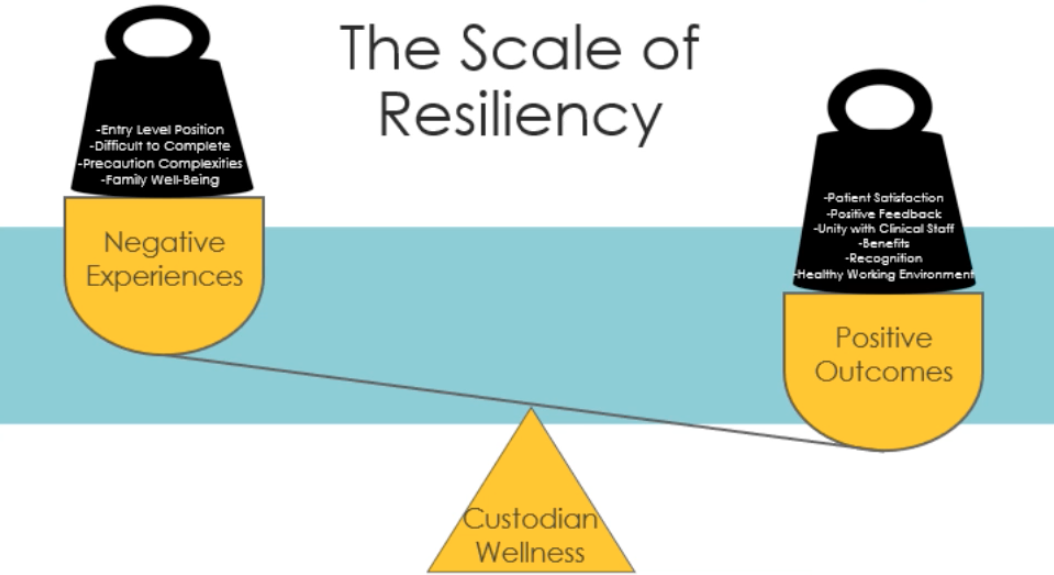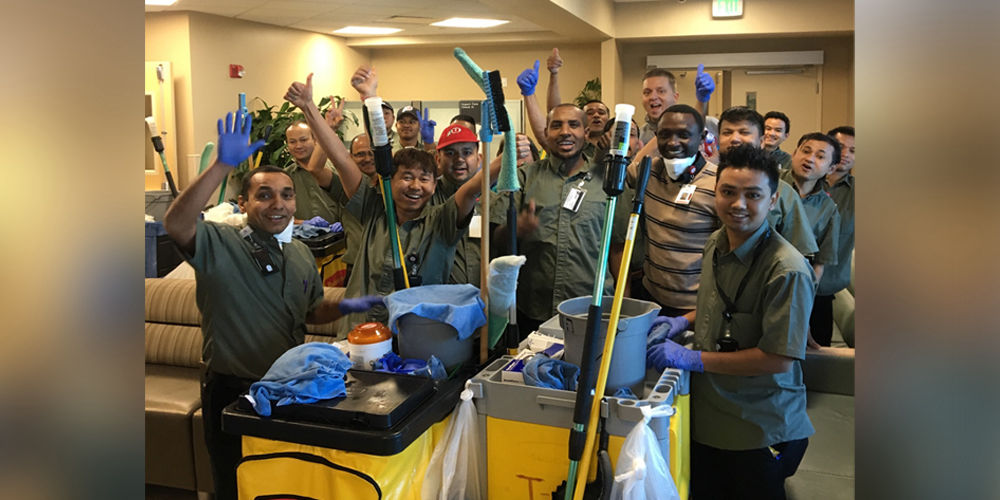AFG’s “Team Talks”: Building Social Capital
This article is part of Alison Flynn Gaffney's “Team Talk” series that serves the 2,500+ employees in our health system’s Service Lines, Ancillary, Planning, and Support Services.
nvironmental services employees, including custodians and housekeepers, play a vital, demanding role within the hospital. I have been with the EVS team for nine years, and before becoming a supervisor, I spent four years as a custodian, doing backbreaking work and putting myself regularly at risk of contact with pathogens.
But like all members of the EVS team, I stayed resilient and persevered. Every day, we emptied and transported linens, infectious and regular waste. We carefully cleaned rooms with droplet or airborne precautions. Throughout the pandemic, our staff has continued to clean these rooms, putting themselves and their families at risk.
Still, EVS staff come to work and work hard, lifting, moving and cleaning over and over. They do this work by learning how to balance the scale of resiliency.
The scale of resiliency: Negative experiences vs. positive outcomes
Like every role in the hospital, custodians and housekeepers have negative experiences in their work: sore muscles, difficult tasks and frustrations. But these negative experiences aren’t what define us and our jobs.
We are not just someone to clean messes; we make rooms beautiful. We keep people safe. We keep the hospital and clinics clean. These are the positive outcomes of our jobs, the most important aspects of our work.
Custodians continue to persevere by balancing the scale of resiliency. On one side, all those negative experiences, the hard days, the lower pay, weigh us down. On the other side, positive outcomes raise us up. To keep that scale in balance and stay resilient, we must focus on the positive, including:
- Improved patient satisfaction indicating that people see their environment as clean, safe and comfortable.
- Appreciation for our work from patients and visitors who see the benefits of our efforts.
- Feelings of teamwork and camaraderie with clinical staff, who also offer encouragement and positive feedback and enjoy the healthy environment we provide.

Patient comment cards often mention the friendliness of custodial staff, the way the staff brightened their days. We hear thanks for keeping the hospital beautiful. Seeing people happy with the environment, with the cleanliness makes all the difference.
We can also recognize the goodness of this organization and the goodness of our work. We can feel thankful for continuing to have a job, through pandemics and hard times. We can recognize the positivity of our work environment and amazing leaders.
Resilience comes mainly from the care that we give
The care we give is exactly what keeps us coming to work, and that's exactly what keeps us running our marathon. It seems to us that we are fighting a good fight every day and succeeding in achieving our goals. And we can see the difference we make.
To give you just one example, four years ago we had an incident in the emergency department where all patients had to be transferred away from the unit. Patients were moved to floors and hallways all over the hospital. When the incident cleared, the entire ED, every room and area, needed to be cleaned in 45 minutes. EVS teams from all over the hospital worked together to get it done.
And we did. It was hard, but everything was disinfected and care in the ED could continue as normal. That’s the difference we make every day. That’s the positive impact we have on patient care. It’s how we help the hospital keep running.
By focusing on these outcomes, the ways we help others, we stay resilient and continue to persevere even through the most difficult tasks.
"It seems to us that we are fighting a good fight every day and succeeding in achieving our goals. And we can see the difference we make. "
James Mwizerwa
Chief Wellness Officer Amy Locke shares practical strategies for leaders to address the real tension we’re feeling between the desire to take a break and the increasing workload.
For medical professionals working night shifts, getting adequate sleep can be a challenge. The Resiliency Center’s Jamuna Jones and Clinical Nurse Coordinator Brooks McAuliffe share an evidence-based “Top 10 Tips” from the CDC's NIOSH training to help night shift workers sleep better.
Nurses are notorious for not taking breaks—the culture of their work environment doesn’t make it easy. Katrina Emery, a MICU charge nurse working on her doctor of nursing practice (DNP), sheds light on how to change culture to prioritize breaks to improve health and wellbeing.
